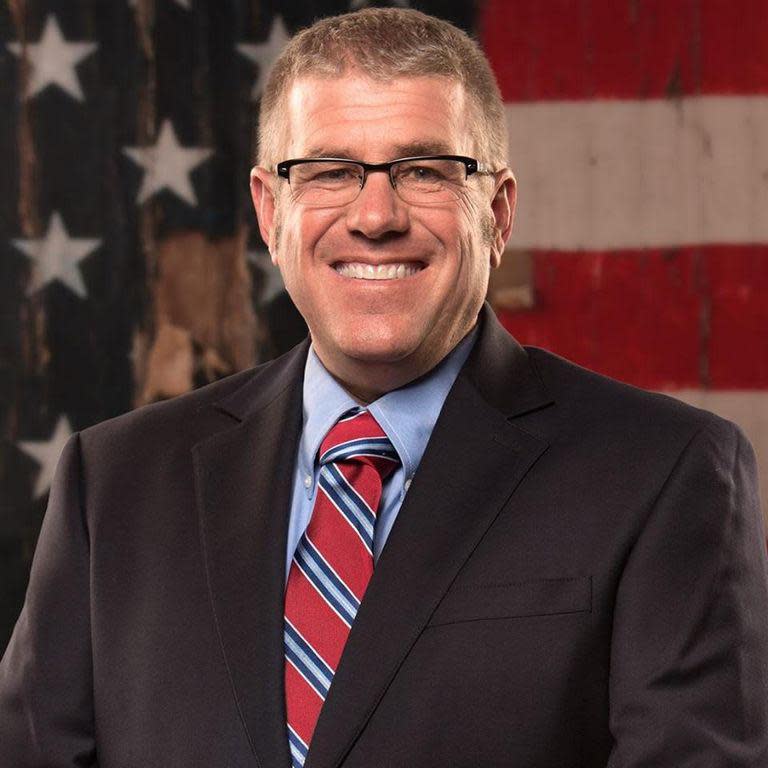Illinois election: JB Pritzker beats Darren Bailey, reelected as Illinois governor

- Oops!Something went wrong.Please try again later.
- Oops!Something went wrong.Please try again later.
Democratic Gov. JB Pritzker was reelected Tuesday, easily beating Republican challenger state Sen. Darren Bailey.
With 70% of precincts counted, Pritzker had 54.6% of the vote compared to 42.1% for Bailey and 3.3% for Libertarian candidate Scott Schluter, solidifying a second, four-year term for the incumbent.
Speaking at the Marriott Hotel in Chicago, Pritzker vowed to not let his supporters down and strove to be a "happy warrior."
"Facing this moment means fighting these battles together," he said. "Together, we must be bold and not shy away from our big "D" Democratic and little "d" democratic values ...Today, we reaffirm what we are fighting for."
At his campaign event at the Crowne Plaza hotel in Springfield, Bailey told his supporters just after 9:45 p.m. that he had called the governor to congratulate him on his victory. While he will not be getting the keys to the Governor's Mansion, he vowed to continue the fight.
“Illinois can be better. Illinois must be better," he said on the stage joined by his wife, Cindy, and running mate Stephanie Trussell. "And JB Pritzker, you need to be better.”
Illinois election results:All the midterm election results in one spot
Gov. Pritzker rides tax relief, record to win over Bailey
Pritzker described Bailey, a downstate farmer and state senator, as "extreme" and "dangerous" adding his opponent's position on abortion, gun violence, and crime would put more Illinoisans at risk. This was especially the sell for voters in Pritzker's hometown of Chicago, where he used Bailey's own words of calling the city a "hellhole" as a way to deter support for his opponent.
Bailey's opposition to Amendment 1, desire to end the state minimum wage, and lessons taught at his private Christian school in Louisville make him the wrong person for the job, Pritzker said.
"This man shouldn't be allowed anywhere near the governor's office," the governor said during a pre-election rally in Springfield on Monday.
Throughout the campaign, the first-term governor championed his record of the Rebuild Illinois infrastructure plan, varying forms of tax relief, and clearing the state's backlog of overdue bills. The accomplishments, he noted, were during the COVID-19 pandemic which he also touted his administration's response as a success.
Bailey had attempted to paint Pritzker as "out of touch" because of his personal wealth, but also attacked the incumbent on crime and economic instability throughout the campaign. Following in the footsteps of former President Donald Trump, who endorsed Bailey prior to the June primary, he sought to "fire" Pritzker with the goal of putting the state back on track.
Pritzker, Bailey's campaign differences
Pritzker's personal wealth, amassed as a heir to the Hyatt Hotel fortune, allowed him to almost entirely fund his own campaign. As of his latest campaign finance quarterly report, the governor had $42.3 million in available funds compared to $766,982 for Bailey.
The challenger's rise to prominence was in many ways tied to his opposition to Pritzker's health orders put in place to stop the spread of COVID-19. On Monday, he and attorney general candidate Thomas DeVore reasserted those complaints during a heated press conference regarding vaccine mandates for school children.
"JB is a thief who stole precious moments from our children and they may never get those moments back," he said, referring to the closure of schools earlier in the pandemic. "Now another experiment is in the works: large-scale child vaccination."
Much of his policy goals were with the intent of upheaving past legislation passed by the Illinois General Assembly, where he has served as a representative of House District 109 in 2018 before winning a Senate race in 2021, and signed into law. Most notably, that meant a full repeal of the SAFE-T Act as he claimed it create a "revolving door" for violent offenders.
Bailey came into the general election after defeating more moderate candidates such as Richard Irvin and securing an endorsement from former President Donald Trump. Following the June primary, however, he had to broaden his message to those outside of his party in the attempt to pull from the state’s Democrat majority.
Challenging this effort was the $24 million that Pritzker spent during the primaries on ads, telling voters that Bailey was “too extreme” because of his beliefs. Critics said the move was a way for the governor to essentially pick his opponent.
Contact Patrick Keck: 312-549-9340, pkeck@gannett.com, twitter.com/@pkeckreporter
This article originally appeared on State Journal-Register: Illinois governor's race sees JB Pritzker defeat Darren Bailey

